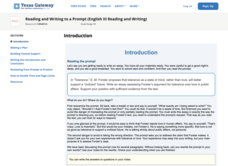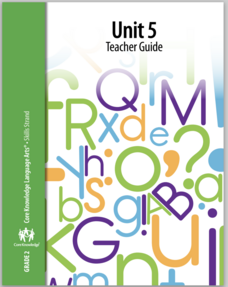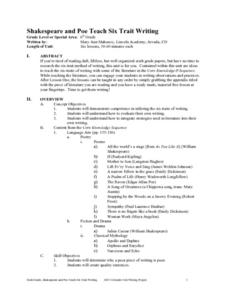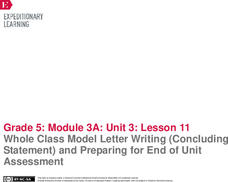Texas Education Agency (TEA)
Reading and Writing to a Prompt (English III Reading and Writing)
Learning to read and write in response to a prompt is an essential skill. Users of this interactive learn how to analyze a writing prompt to determine the many facets that must be addressed, how to plan and structure a response, and how...
Core Knowledge Foundation
Second Grade Skills Unit 5: Sir Gus
A unit focuses on second-grade skills, specifically spelling, grammar, writing, and reading. Over six weeks, scholars review spelling patterns and tricky words, and explore verb tenses, adjectives, subjects, and predicates. They write...
Curated OER
Writer's Toolbox
Present the class with a slide show that will give them a great head start in writing expository and narrative texts. The information is highlighted for easy note taking, well organized, and presented in a kid-friendly manner. It...
Curated OER
Shakespeare and Poe Teach Six-Trait Writing
A Six-Trait Writing instructional activity helps your middle schoolers liven up their word choice and shows them how to evaluate their own writing. Class members take a close look at the language used in poems by Shakespeare, Kipling,...
Curated OER
Whose Rite Is It?
The class explores and debates, from multiple perspectives, a petition to allow Hopi Indians to take golden eagle hatchlings from a federal wildlife sanctuary for use in a religious ceremony. Pupils defend their personal views on the...
Curated OER
Read Between the Lines
Build comprehension, inference, and conclusion skills by encouraging learners to see the importance of reading between the lines.
Curated OER
The "Write" Stuff: Strategies and Conventions for Imaginative Writing
A comprehensive and immersive series of lessons that examines various aspects of story development leads learners into writing a narrative of their own. Writers develop an understanding of the writing process as they use the learning...
Curated OER
Expository Writing (Informational Brochure)
Design an informational brochure to urge people to move to a specific community. The purpose of this activity is to expose pupils to expository writing. After creating the brochure, they write a three-paragraph persuasive or...
Curated OER
Mr. Putter and Tabby Write the Book: Comprehension Skills
Your learners are just starting to read books on their own, so this resource is perfect! Cut out the bookmark-size slips of paper for learners to utilize while reading Mr. Putter and Tabby Write the Book. Each of the five bookmark pages...
Curated OER
Paragraph Structure
Practice writing paragraphs with this scaffolded worksheet. The "hamburger" model is used on the second page, following some examples and guided practice on the first page. Give beginning writers concrete, tangible support as they embark...
Curated OER
It's A Mystery!: Drawing Conclusions
Using a unique approach, this resource provides clues and a logic problem for learners to solve in order to have them draw conclusions. This would be an interesting and fun way for students to practice reading, and critical thinking skills.
Texas Education Agency (TEA)
Drawing Conclusions Based on the Sufficiency and Strength of Research (English III Reading)
High school juniors learn how to construct a strong argument by crafting a claim and using neutral language backed by evidence from reliable sources. To do so, they learn to evaluate sources and evidence to support claims. They then...
K20 LEARN
Seeing the Big Picture - Incorporating Thesis, Evidence, Elaboration, and Concluding Statements in Your Essay: Elements of an Essay
Writers examine the elements of an informational essay, identify them in several essay snapshots, and then craft their own to demonstrate what they have learned.
K20 LEARN
Writing An Argumentative Paragraph: Argumentative Writing
Learning how to craft a cogent argument based on a solid claim, supported with evidence and solid reasoning, is an important life skill. Teach middle schoolers about argumentative writing with a lesson asking them to analyze the claims,...
ReadWriteThink
Persuasive Essay: Environmental Issues
Young environmentalists learn how to craft a persuasive essay about an environmental issue they consider important. After studying the components of a persuasive essay and examining a student model, writers brainstorm possible topics and...
EngageNY
Speech Writing: Identifying Criteria for a High Quality Conclusion
Learning is never-ending. Scholars learn about effective conclusions as they continue watching a video of an opinion speech. After analyzing the speech's conclusion, they work in small groups to write an ending for their own speeches.
Flipped Math
Reasoning and Proof
Make sure the conditions are right. Pupils watch a video introducing conditional statements and their related statements. Learners find out how to identify the hypothesis and conclusion as well as write the converse, inverse, and...
EngageNY
Building Background Knowledge and Making Inferences: What Is a Natural Disaster?
That's a disaster! Scholars complete a gallery walk to view images and make inferences about natural disasters. They fill out a note catcher about what they observe and infer any questions they may have. They then participate in a World...
EngageNY
Whole Class Model Letter Writing (Concluding Statement) and Preparing for End of Unit Assessment
Pupils work in small groups to collaboratively write a concluding paragraph for their opinion letters about Jackie Robinson's legacy. Then, scholars share their opinion, reasons, and evidence with a classmate.
EngageNY
The Painted Essay: Developing a Conclusion and Adding Linking Words
In conclusion ... this essay is the best! Scholars continue working on their painted essays by creating the conclusion. They work in groups to analyze the concluding paragraph in the model painted essay, The Electric Motor. After...
EngageNY
Our Group Readers Theater: Revision, Conclusion, and First Rehearsal
Revision is the key to great writing. Individuals revise their readers theater scripts and write a group conclusion. Scholars then perform their scripts for another group and receive feedback.
EngageNY
Mid-Unit Assessment: Completing My Draft Position Paper
What's the difference? Scholars analyze the similarities and differences between introductory and concluding paragraphs. Then, using a model essay as a guide, they write their draft position papers.
EngageNY
Writing: Analyzing the Conclusion of “The Golden Key” and Drafting a Compelling Conclusion for the Hero’s Journey Narrative
There's something different here. Using a note-catcher, scholars determine the differences between the conclusion of a piece of analytical writing and the conclusion of a narrative. Next, they begin drafting their own narrative...
EngageNY
Building Context for the Narrative: Slavery in America
Scholars use an Analyzing Images: Slavery in America handout to make predictions from pictures featuring slavery. They then discuss the pictures with partners. Learners further their thinking by close reading The Slave Trade and...

























